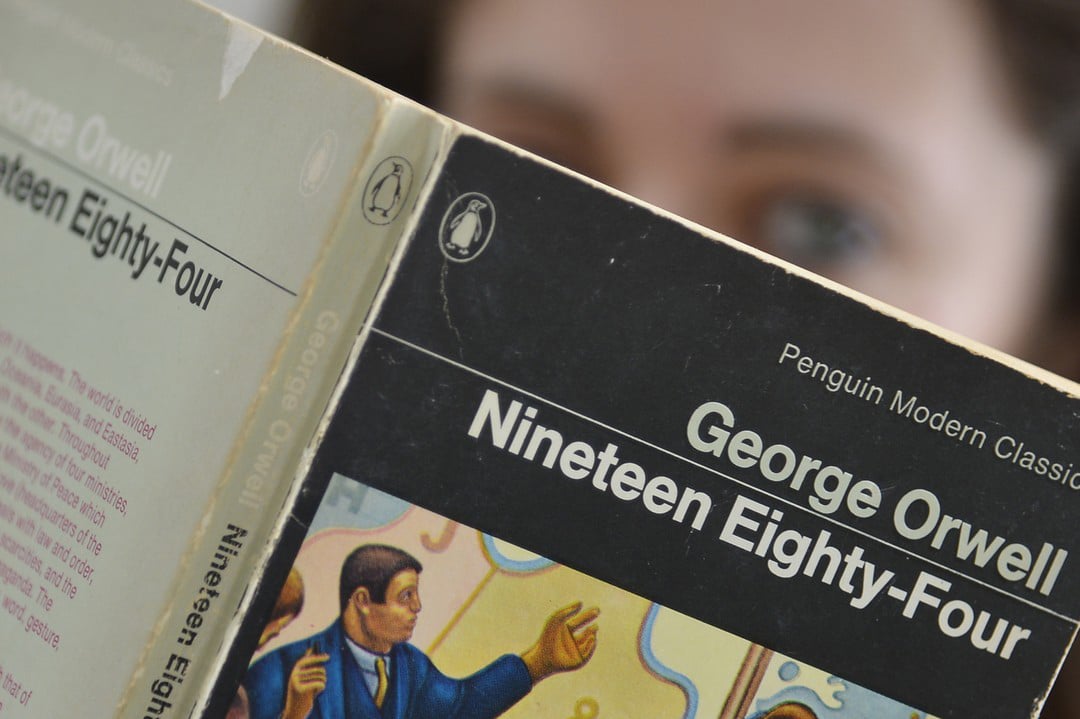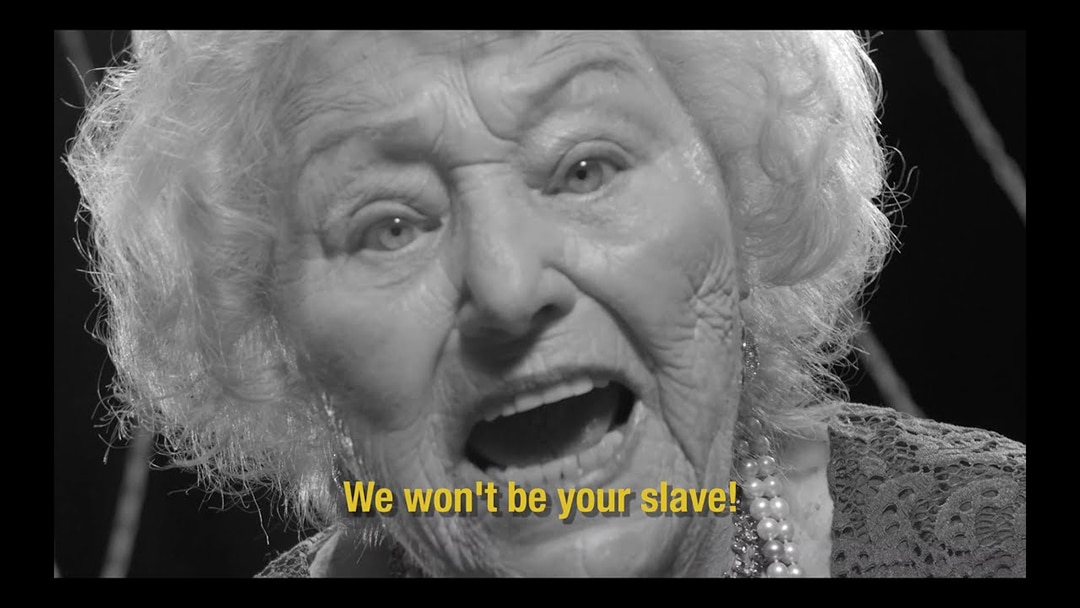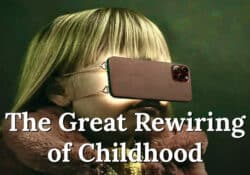

A Brave Young Teen Reads Orwell
by NewZealandDoc | Jan 30, 2023
About a year ago I chanced to speak with a teenager, the daughter of a friend, at a gathering of the ‘resistance’. Like her mother she is a musician, and she attends a private girls’ high school here in Wellington. I asked about school and, in particular, about the novels she was reading in her English class during her senior year. I was surprised to hear that no novels were currently assigned … so I inquired further. “We get excerpts,” she informed me, “but over the course of last year we read one entire book.”
So during her junior and senior years at a prestigious girls’ school in an ostensibly first-world Western educational system, the curriculum was nearly devoid of literature.
I shuddered to ask about her history classes, but I did take the liberty of promising her a copy of Orwell’s 1984. To my delight but not my surprise, because she is a curious person avid to learn, she devoured the extracurricular novel within two weeks. Perhaps too, because she was unjabbed and was one of the very few who refused to wear a mask at her school, surrounded as she was by a sea of unthinking submissive fellow students, she was all the more motivated.
I recall that this earnest young kid was denied the opportunity to participate in a summertime music camp because of her jab status thanks to then Prime Minister Jacinda Ardern’s imposed apartheid system. The music faculty who ran the summer school didn’t have the guts or the wisdom to allow a healthy young talented player, who had been an eager participant in the past, to join their ‘vaccinated’ ensemble.
I myself, having donated Orwell, decided to revisit a work I hadn’t read in years, and I was struck by how poignant and delicate the great author’s love scenes were rendered. Most of the final third of the book, devoted as it was to a meticulous delineation of psychological and physical torture, seemed didactic and less appealing, though agonizingly true.
I wondered how a young mind would engage with, interpret and understand such a challenging book, a book that ended with the lover-protagonists’ immensely sad betrayal of each other, having been broken.
I wondered how a young mind would understand the oppressive force of a State that turned the meanings of words into their opposites and altered history to suit its prevailing political needs.
I wondered whether this teenager understood the concepts of free expression and open debate, mired as she was in a corona culture of cancellation, suppression, ignorance and ostracism.
I wondered what and how she was being taught.
Teaching itself, like most forms of human interaction, may be coercive. Everywhere we are surrounded by attempts to persuade, cajole, entice, allure or, as we have seen so clearly these past three years, simply force us to a particular end. Advertisers use the lighter arts of seduction to bring our monies to their products; governments, when their own light touches fall short of their goals, resort to mandates. Free choice, like free thinking, is under constant assault. Is teaching yet another one of these assaults? Can one teach without resorting to shaping, molding, coercion?
The Socratic method is generally understood as a method of questioning, of inquiry in the pursuit of truths. The Socrates depicted by Plato claimed to know virtually nothing but inquired indefatigably of his auditors. It is best shown in the dialogue Theaetetus – shown in its ideal form, as far as I’m concerned, since I have had the general impression from many of the other dialogues that the modest unknowing Socrates quite purposefully led his students to his own preordained convictions about philosophical matters. In the Theaetetus, however, our Socrates – or, at least, Plato’s Socrates – defines his role as that of a midwife. It is a striking and magnificent analogy, for the teacher – Socrates, who happens incidentally to be the son of a midwife – is one who merely helps to bring forth that which is immanent within his student. He facilitates the birth of knowledge residing within. As he says:
“I am so far like the midwife that I cannot myself give birth to wisdom … though I question others, I can myself bring nothing to light because there is no wisdom in me … Those who frequent my company … have never learnt anything from me; the many admirable truths they bring to birth have been discovered by themselves from within. But the delivery is heaven’s work and mine” (Cornford, p. 26) [1]
Centuries later, the much-misunderstood and often maligned Sigmund Freud introduced the technique of free association after having been frustrated with attempts at hypnosis – a form of suggestion – for the treatment of neurosis. Free association was one of Freud’s most magnificent achievements, and one of the pillars upon which psychoanalysis is founded. One can hardly overestimate the uniqueness of a setting in which a person is encouraged simply to say anything and everything that comes to mind, without self-censorship, interference or judgment, no matter how bizarre, perverse, repulsive or frightening. Freud in essence developed a method of midwifery akin to Socrates – facilitating the birth of hidden knowledge within.
Without diverging into the complexities and intricacies of free association within the treatment paradigm of psychoanalysis, necessitating as it does the patient’s unquestioning trust in the analyst, which is hardly ever complete, and involving the inevitable self-suppressions of shameful, dubious or delicate material, the introduction of this technique, its astonishing potential, and the inherent assumptions of liberty and autonomy within its very fabric are scarcely imaginable.
Free association represents a culmination of the Socratic method and a blazing example of the antithesis to force and censure. Freud himself devoted a half-hour daily to self-analysis via free association throughout his life, an example, wryly enough, far more honored in the breach by his psychoanalytic followers than in the observance.
Socrates and Freud were creatures of their times and mores and culture. Yet the method they devised provided the very tool to transcend the cultural, moral and political restrictions of their respective societies. This is a point I cannot emphasize enough, and the same may be said for the American Founders who, trammeled as they were by their own societal prejudices, nonetheless produced a document whose basic principles provided the means to overcome such limitations.
Virtually everything about these past three years of blight under the shadow of the Corona War has ventured to stifle and eliminate liberty. The ‘science’ was invoked to silence debate: it became something that would tolerate no doubt, discussion or criticism — no real science, in fact. People who attempted to offer differing opinions were eliminated from social media. Doctors who asked for evidence behind oppressive restrictions and public health dictates were persecuted. Those who dared to champion bodily autonomy by refusing the jab were set apart.
In fact, it has all grown stale and boring, as befits the gray suffocating miasma of enslaving control.
I’m sick of it.
If we have learned nothing else from these past three dystopian years, it is that our once-trusted authorities — in government, media, ‘science’, business and even sport — have shown themselves to be wholly corrupt and cowardly. Their suppression of debate, their outright refusal to participate in open exchanges, to allow questioning and inquiry, and the relentless insistence on their ‘one way’ — this would all be laughable were it not so poisonous.
But what of today’s youth? They seem to have little awareness of history, and even less understanding of the immensity of the struggles to realize our unalienable right to freedom of expression – not from any fault of their own, but from the fault of the institutions that are betraying them.
My friend’s daughter, who had the courage to withstand the pressure of peers and school and the curiosity to search for books – whole books, not smatterings – is an exception. I have had the pleasure of meeting several other brave and exceptional youths who have withstood an immensity of pressure to mask up, conform, relinquish bodily autonomy, who have endured ostracism and ridicule, but who have maintained their dignity and independence.
These wonderful exceptions give me great hope that we can indeed establish a future graced by vitality, autonomy and choice, one that nourishes the single most genuine and unassailable contribution of the West towards human progress: liberty.
And perhaps in this beckoning future I may gently inquire of these young forming souls what they think of Socrates, Freud, and the fate of Julia and Winston in 1984 …
Subscribe to NewZealandDoc’s Newsletter
1 “Plato’s Theory of Knowledge: the Theaetetus and the Sophist of Plato,” translated and with a running commentary by Francis Macdonald Cornford, London: Routledge and Kegan Paul, Ltd. 1915.





0 Comments